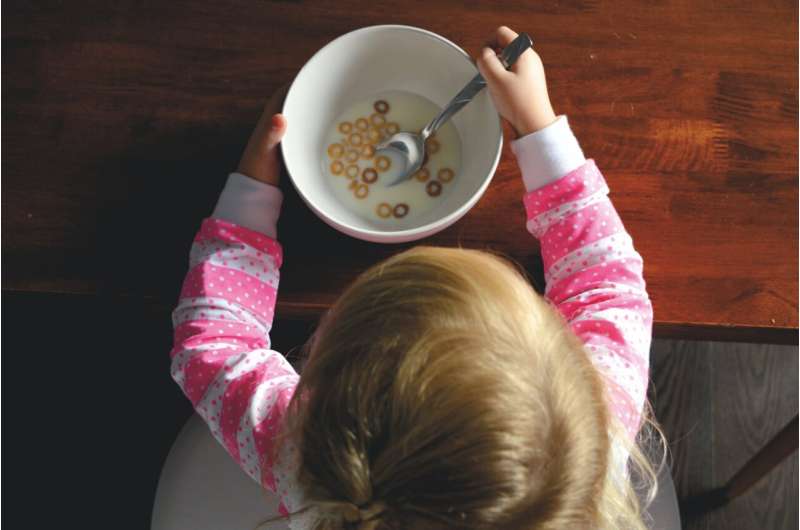This article has been reviewed according to Science X's editorial process and policies. Editors have highlighted the following attributes while ensuring the content's credibility:
fact-checked
peer-reviewed publication
proofread
How diet affects a child's mental health

Children who have a healthy diet throughout their childhood have better mental health when they are eight years old. This is shown by one of the largest surveys of its kind, according to researchers from the University of Agder (UiA) in Norway.
"Nobody raises an eyebrow when we talk about how diet affects our physical health. The link between diet and mental health, however, is not as obvious," says child psychiatrist and postdoctoral research fellow Christine Helle at UiA.
But the link is there. And it turns out to be clearer than we previously thought.
Researchers from UiA have used data from the Norwegian Mother, Father and Child Cohort Study. This is one of the world's largest health surveys. In the dietary study, the researchers used data from 40,000 children who were followed over several years.
"In this study, we see a clear connection between what children eat during their early years and personality traits and symptoms of anxiety and depression when they are eight years old," says Professor Nina Cecilie Øverby at UiA.
She emphasizes that the research cannot establish cause and effect, but that there is a connection. The findings have been adjusted for the influence of other characteristics that the researchers know may be important, such as the mother's education and mental health.
Five personality traits
The mothers answered questions about their own and their child's diet at various stages, during the pregnancy and when the child was six and eighteen months old. New rounds of surveys were conducted when the child was three and seven years old.
At the age of eight, children who had a healthy diet growing up scored higher on personality traits such as conscientiousness, openness, extraversion and benevolence.
Children who had a less healthy diet scored higher on personality traits related to neuroticism.
"The association we find between diet early in life and personality traits has not been shown in previous studies to our knowledge," says Øverby.
The personality traits are based on the Big Five model, which is the leading scientific theory of how our personality is shaped.
"Personality traits are dimensions that measure the degree of psychological characteristics. Personality traits are important for our mental health, even if they're not linked to mental disorders or ailments," says Helle.
She nevertheless adds that the trait of neuroticism are often associated with vulnerability to developing anxiety and depression.
Nutrition is a social responsibility
When the researchers talk about a good diet, they talk about a diet that is in line with the Norwegian nutrition recommendations (in Norwegian only). Fruit and vegetables, whole grain products, fish, and home-cooked meals.
"The body develops the nervous system, internal organs and the brain at the beginning of life. For this, the body needs energy from food. In addition, the food we eat can affect how our genes work," Øverby says.
The researchers emphasize that facilitating a healthy diet is a social responsibility.
"With this knowledge as a foundation, it becomes even more important to offer children a healthy meal in nurseries or during the school day. It's about ensuring social equity in matters of health, and that is especially necessary to underline in these uncertain economic times," Helle says.
The researchers describe the results as very robust. There are, however, some weaknesses in the study. The mothers had to fill in the forms themselves, among other things.
"We also see that the women who take part in the survey are more highly educated and smoke less than average. Several such features indicate that they do not represent an average of the population," Øverby says.
She still thinks there is no reason to believe that the results would have been different with a different sample.
It's never too late
The study measures the effect of diet early in life on the personality of eight-year-olds. The natural question then becomes: When is it too late to make changes?
The researchers can reassure you that it's never too late to start eating healthier and benefit from it.
"We are not fully developed as eight-year-olds. If you establish good eating habits early in life, a lot has already been done. But we cannot eat our way to the personality we want. There are many other conditions that affect it, especially the genes you carry and the life conditions you encounter," Helle says.
She points out that this study, however, shows that good nutrition early in life is a step in a positive direction.
The study is published in the journal Nutrients.
More information: Kristine Vejrup et al, Diet in Early Life Is Related to Child Mental Health and Personality at 8 Years: Findings from the Norwegian Mother, Father and Child Cohort Study (MoBa), Nutrients (2023). DOI: 10.3390/nu15010243




















